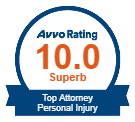In a recent article on why insurance companies love Virginia's contributory negligence law, we wanted to share with you what the rule means and why it tilts the scale in favor of the insurance companies.
The question of how you deal with this rule is still open. Let's discuss this now.
You need to prove that the defendant is 100 percent at fault or you won't be able to receive any compensation. This can be a real challenge in some cases. More than ever, your case rests on hard evidence, such as:
- The police report of the accident;
- Witness statements;
- On-the-scene investigation and pictures;
- Medical reports;
- Collection of information on the defendant: cell phone use while driving, intoxication, speed, traffic violations, etc.
You will have to be very careful not to sign any forms or agree to anything that could be held against you afterwards. Do not apologize about anything, even when you think you could have avoided the crash or if you are distressed by the other party's injuries. Do not make any statement to the insurance adjuster, even on the phone.
Considering what is at stake, namely that you could end up without any compensation if you are found to have made even a small contribution to the crash, you should have a free discussion of your case with an experienced Virginia auto accident attorney.
If you have been hurt in a Virginia car or truck crash, please contact our Warrenton or Culpeper office today. You can discuss your case with one of our skilled, dedicated attorneys to see how we can help you secure fair compensation.








